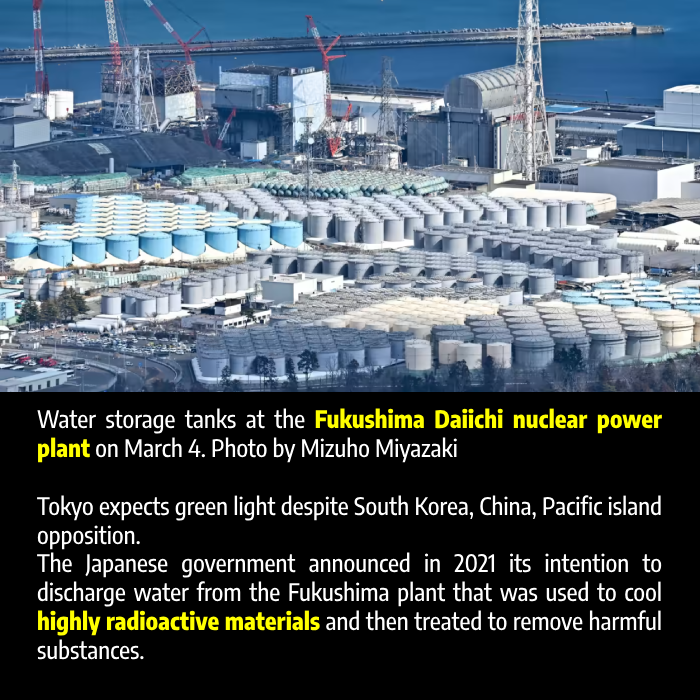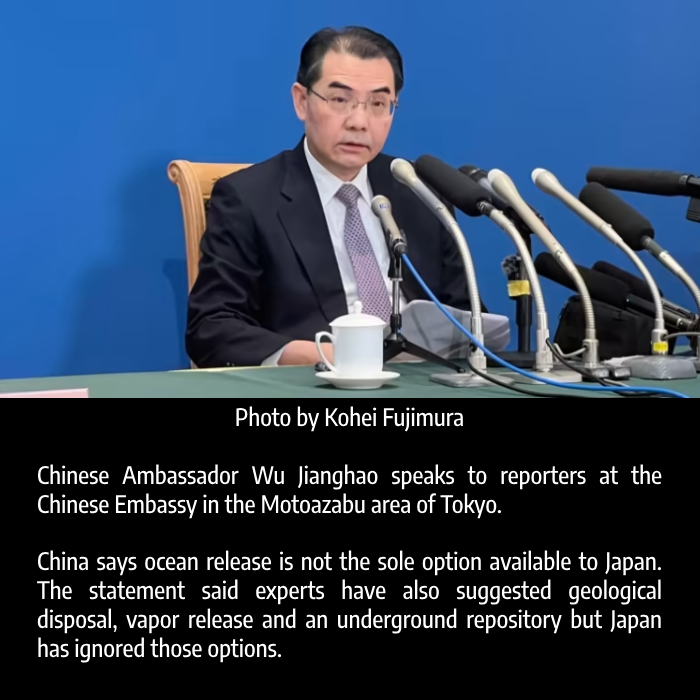By Sayumi Take and Steven Borowiec, Nikkei staff writers.

The International Atomic Energy Agency is likely on Tuesday to greenlight a plan by Japan to release treated water from the disaster-struck Fukushima Daiichi nuclear plant into the Pacific Ocean this summer, despite outcry from Asian neighbors.
IAEA Director General Rafael Grossi will meet Japanese Prime Minister Fumio Kishida in Tokyo to present the agency’s report on safety reviews conducted at Japan’s request. The Japanese government announced in 2021 its intention to discharge water from the Fukushima plant that was used to cool highly radioactive materials and then treated to remove harmful substances.
The water is generated on an ongoing basis and stored in over 1,000 tanks at the site, as it cannot be brought off the plant’s premises. Plant operator Tokyo Electric Power Co. Holdings (TEPCO) has said that storage space will run out soon.
The IAEA’s final report will be based on an on-site review that was completed in June. The organization has not identified any problems through its reviews on aspects of the process. Japan is hopeful that the group will endorse its plans, after which it will decide on details such as the release date.
The nation hopes the IAEA’s evaluation will mollify opposition in neighboring countries.
China’s ambassador to Japan, Wu Jianghao, told reporters on Tuesday that there is no precedent for wastewater being released into an ocean after a nuclear accident.
“The Japanese side says that nuclear power plants around the world are all discharging wastewater, but that water has not been exposed to a reactor core that has melted,” Wu said.
The Fukushima water is not comparable with regular cooling water, he added.

In a statement, the Chinese Embassy noted that the IAEA promotes the peaceful use of nuclear energy and said it is not the optimal body for assessing the long-term environmental and health impacts of wastewater discharge. An IAEA report does not exempt Japan from its obligations under international law, the statement said.
China says ocean release is not the sole option available to Japan. The statement said experts have also suggested geological disposal, vapor release and an underground repository but Japan has ignored those options.
In South Korea, the release of the water has become a matter of growing concern among the public and a divisive issue between President Yoon Suk Yeol’s ruling People Power Party and the opposition. Opposition parties are calling on the Japanese government to call off the release and seek alternatives, such as building new facilities to store the wastewater.
Protests against the wastewater release have taken place in recent weeks outside the Japanese embassy in Seoul. The opposition has also called on Yoon to push Tokyo for more detailed data on any potentially dangerous elements the water could contain.
“The Japanese government hasn’t been clear about how the wastewater could affect sea life, particularly the amount of radioactive elements that could end up in our food,” said Kim Ji-moon, an official from the left-wing Justice Party.
“Our country is one of the world’s highest per capita consumers of seafood, so this is a matter of health and safety,” Kim told Nikkei Asia.
Yoon’s party has had to counter allegations that the administration is siding with Japan on the issue of the wastewater release and neglecting public well-being at home. In a briefing on Monday ahead of Grossi’s presentation in Tokyo, an official from South Korea’s oceans ministry said, “Our government has consistently demanded that Japan release the wastewater in compliance with international law and standards in a way that is scientifically and objectively safe.”
Fisheries around the region fear the water’s release will cause reputational damage that will reduce demand for their products. South Korea still maintains a ban on imports of seafood from the area around the Fukushima plant, citing safety concerns, while China, Hong Kong, Taiwan and Macao restrict imports.
On Tuesday, People Power Party floor leader Yun Jae-ok said in the National Assembly that South Korea’s prohibition will remain in place. “It could be 10 years, it could be 100 years — until the public is assured, seafood imports from Fukushima will be banned,” Yun told reporters.
Island nations in the Pacific have joined the outcry. The Pacific Islands Forum, a regional grouping headed by Cook Islands former Prime Minister Henry Puna, stressed in a June news release that the forum is “fully committed to addressing strong concerns for the significance of the potential threat of nuclear contamination to the health and security of the Blue Pacific, its people, and prospects.”
Puna warned Japan not to discharge the wastewater “until such time that all parties agree that it is verifiably safe to do so.”
Source: Nikkei Asia. 4 July 2023